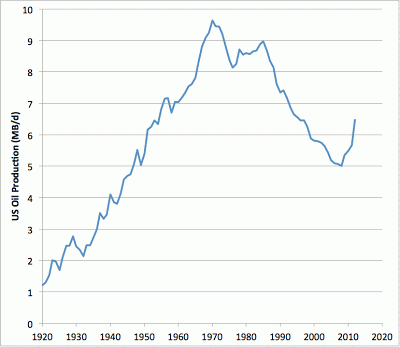The incessant drumbeat of media-relayed propaganda concerning the supposedly new energy-abundant era of oil-and-gas abundance awaiting us due to hydraulic fracking, "fraking", has succeeded to
a very large degree in shaping public consciousness, and with it, government
policy. That success, however, occurred at the expense of truth, and likely the
future solvency of us all, as I shall explain.
Following the run-up in gas prices
to $147.00 per barrel back in July 2008, the general public began to take
warnings that we had reached, or were about to reach, the all-time production
of oil, planet wide, "peak oil", very seriously. This public perception, though
intangible, had very tangible, real-world implications. If the public believed
that we were at, or near, peak oil, then public policy would logically involve
transitioning to renewable energy sources. This would be very bad news for the
oil industry, as well as for Wall Street. The oil industry had about twenty
trillion dollars of investment value tied up in its refineries, pipelines, ships,
and most importantly, its oil in-the-ground assets. Moreover, Wall Street had still
vaster amounts of monies invested in, or used to speculate upon, oil-and-gas
industry future production. The value of these investments were threatened by
the changed public perception that peak oil was at hand.
The response was a flurry of
stories as to how the technique of fracking for oil and gas would soon make
these substances abundant once again. America would soon become energy
independent etc. President Obama weighed in during his 2012 State of the Union
speech in which he falsely proclaimed that America had a "nearly 100-year
supply" of natural gas mainly because of fracking. (1)
The culmination of this propaganda
blitz was the release in June 2012, of a supposedly scientific study entitled: "Oil
the Next Revolution" (2) by Leonardo Magueri. Allegedly, this study "proved"
near-term energy abundance from fracking-derived oil and gas for North America.
Maugeri is a former high executive
of Eni, an Italian energy company, which is ranked 6th in the world.
(3) Leonardo
Maugeri is currently an Associate Professor in the Geopolitics of Energy
Project and the Environment and Natural Resources Program at the Harvard
Kennedy School's Belfer Center for Science and International Affairs. The
Belfer Center is privately funded, and is *not* academically associated with
Harvard University. It is a separate, privately financed, entity, located at
Harvard. It is not, does not speak for, Harvard University.
Maugeri's study was heavily and
wholly uncritically reported on by all mass media in the US and Canada as
though it was a declaration of absolute truth. It was, in fact, nothing but a
propaganda exercise engaged in by the energy industry, for the energy industry's
bottom line--and Wall Street's as well. Uncritical reporting even left the
impression that it was a study released by Harvard University itself, when it
had nothing to do with Harvard.
Aside from overtly or covertly implying
that the study was from Harvard University itself, not a corporate-propaganda
center located on the Harvard campus, the study was filled with misstatements,
unexplained assumptions, and clear evidence that Maugheri did not even
understand the distinction between basic concepts such as resources and
reserves. (4) (Reserves are a subset of resources--often a small subset. To
conflate them together is to make any resultant findings meaningless, though
overoptimistic.)
Numerous critical assessments of
this study were produced following its much-trumpeted release (5) (6). That
being the case, I will not reprise these studies, other to say that it proved
to be a case of "garbage in--garbage out." However, none of the critical studies
were ever reported to the public. Even news sources such as NPR continued to
hype the limitless abundance line. This line, though false, is now the "conventional
wisdom".
If a single graph could expose the
hype behind fracking it would be this one:
US Crude OIl Production 1920-2012 by Early Warning
US Crude OIl Production 1920-2012 by Early Warning
US Crude OIl Production 1920-2012 by Early Warning
Source: http://earlywarn.blogspot.com/2013/03/us-crude-oil-production-1920-2012.html#more
All of that hype is about the small
uptick in US oil production seen above. That is it! Further, production has
stabilized for the Bakken region, one of the longest fracked regions:
Bakken Well Statistics by Early Warning
Bakken Well Statistics by Early Warning
Bakken Well Statistics by Early Warning
Source: http://earlywarn.blogspot.com/2013/01/bakken-well-stats.html#more
This is because, unlike
conventional oil and gas wells, fracked wells typically lose 80 to 95% of their
production within three years.
Decline Curve for Bakken Tight Oil Wells by Grist.org
Decline Curve for Bakken Tight Oil Wells by Grist.org
Decline Curve for Bakken Tight Oil Wells by Grist.org
Source: http://grist.org/news/why-the-fracking-boom-may-actually-be-an-economic-bubble/
(Note: You can view every article as one long page if you sign up as an Advocate Member, or higher).








